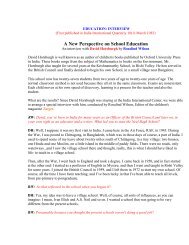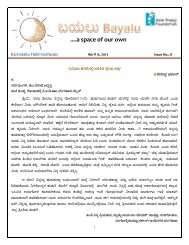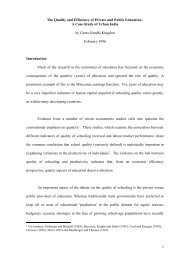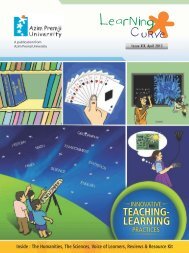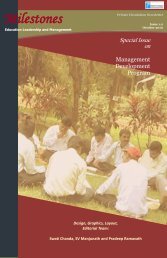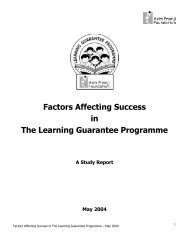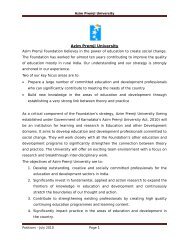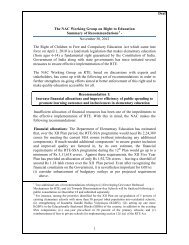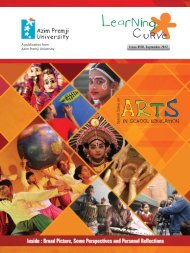Indesign Pagesnew.indd - Azim Premji Foundation
Indesign Pagesnew.indd - Azim Premji Foundation
Indesign Pagesnew.indd - Azim Premji Foundation
Create successful ePaper yourself
Turn your PDF publications into a flip-book with our unique Google optimized e-Paper software.
compare different periods and places, understand the reason<br />
for observed differences, express themselves clearly and give<br />
detailed descriptions or present a summary of situations and<br />
processes, etc.<br />
In addition, we felt the ability to use a textbook constructively<br />
also qualifi ed for evaluation because it is important from the<br />
point of view of learning the social sciences. So we permitted<br />
students to use their textbooks freely during examinations.<br />
One practical benefi t in adopting the open-book approach<br />
was that we no longer needed to print maps, pictures,<br />
graphs etc for the question papers - children were often<br />
asked questions related to diagrams in the textbook. So all<br />
they needed to do was locate the relevant map, picture or<br />
graph in their textbook during the examination to give the<br />
answer.<br />
By shifting the focus of evaluation to these aspects we<br />
sought to rid children of the fear of examinations and the<br />
burden of memorizing/forgetting the subject content.<br />
To summarize, the questions we set sought to evaluate in<br />
students the ability to:<br />
1.<br />
2.<br />
3.<br />
4.<br />
5.<br />
6.<br />
7.<br />
Locate relevant information in the textbook.<br />
Understand the aim of the question and give the<br />
appropriate, to-the-point answer.<br />
Present a summary of discussions conducted on any<br />
topic.<br />
Analyze new information or new situations on the basis<br />
of discussions conducted on any topic.<br />
Extract information from maps, pictures, tables and<br />
graphs.<br />
Compare different situations.<br />
Understand the reasons or causes for any situation.<br />
What were the Different Kinds of Questions?<br />
1.<br />
2.<br />
3.<br />
Objective questions – giving the answer in one word or<br />
sentence, fi lling in the blanks - such questions accounted<br />
for 16 marks out of 100.<br />
Questions whose answers could be found in a specifi c<br />
location in the textbook - such questions that required<br />
locating the correct answer accounted for 30 marks out<br />
of 100.<br />
Questions whose answers required referring to more<br />
Section D<br />
Assessment of Social Science in Schools- Our Experiences, Experiments and Learnings<br />
than one portion of the textbook, or questions whose<br />
answers were not contained in the text but could be<br />
extracted from pictures, maps, etc or by reasoning,<br />
extrapolation, imagination, knowledge and experience<br />
- such questions based on abilities like comparison,<br />
analysis, reasoning, extrapolation and reading maps,<br />
pictures and tables accounted for 54 marks out of 100.<br />
Evaluation Policy: Some Considerations<br />
1.<br />
2.<br />
3.<br />
Not more than one question from the textbook could<br />
be included in the examination, the attempt being to<br />
formulate new questions for every question paper.<br />
Those who answered in their own words, regardless of<br />
whether the language was perfect or not, were given<br />
additional marks.<br />
Marks were cut for answers taken from the textbook<br />
that included unnecessary text.<br />
Some Sample Questions<br />
1. Objective questions<br />
Correct only the incorrect sentences given below:<br />
1.<br />
2.<br />
3.<br />
4.<br />
Banks do not pay interest on money deposited in a<br />
savings account.<br />
Money can be withdrawn daily from a savings account.<br />
Only owners of large factories can get loans from<br />
banks.<br />
Fixed term deposits attract more interest.<br />
Fill in the blanks:<br />
1.<br />
2.<br />
3.<br />
4.<br />
5.<br />
Akbar abolished the pilgrimage tax in ------------ and the<br />
------------- tax in 1564 in order to win the support of<br />
------------<br />
At the start of Akbar’s reign, there were only --------and<br />
-------------- amirs in his administration.<br />
Akbar adopted the policy of ------------- after 1580.<br />
The appointment of the Mughal mansabdars was done<br />
by -----------.<br />
During Aurangzeb’s reign there was a shortage of<br />
--------------- to distribute among the amirs.<br />
2. Questions that required to-the-point answers<br />
1.<br />
When the fi rst parliament was convened in England,<br />
Pg No: 98



